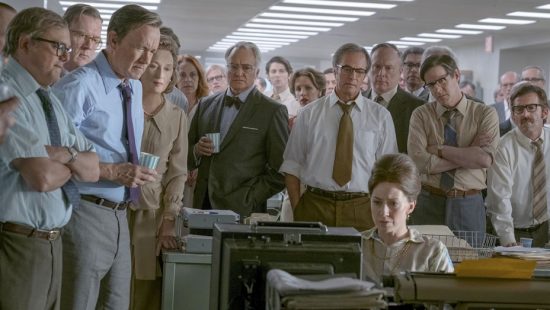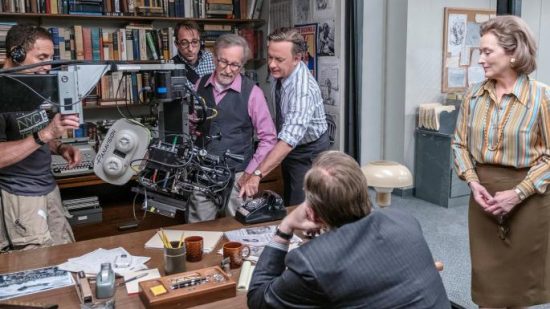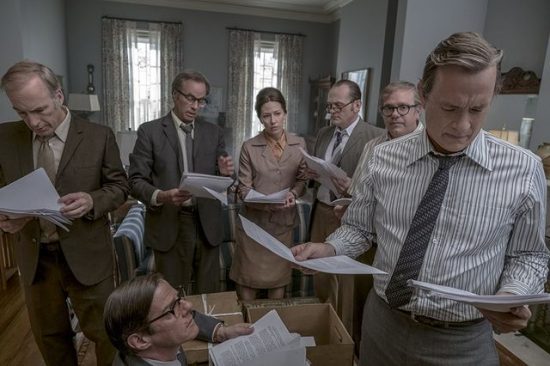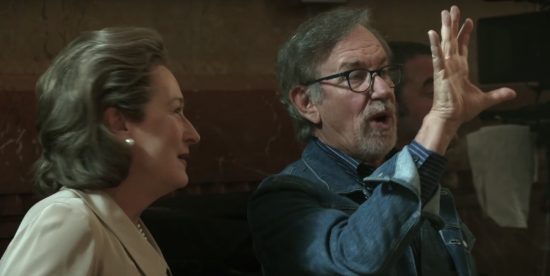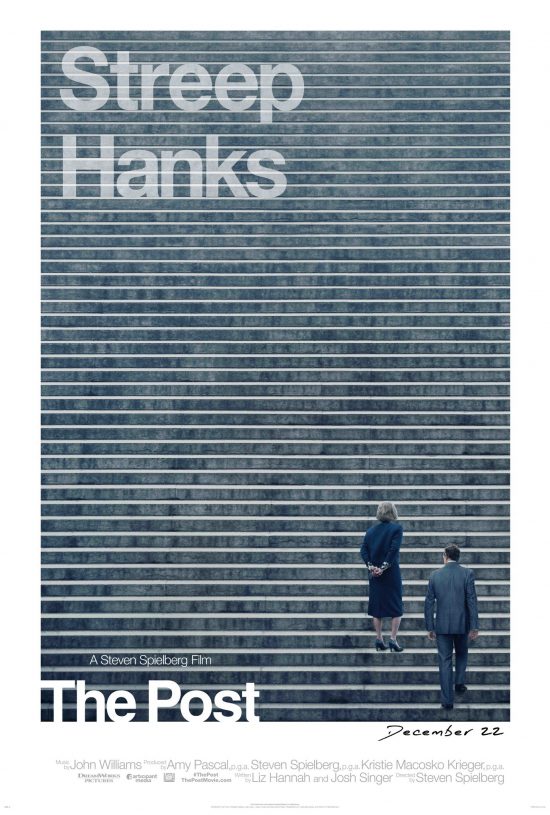SpielBLOG: The Post – A Steven Spielberg Retrospective
The election of Donald Trump came as a shock to liberal Hollywood and lifelong Democrat and declared Obama supporter Steven Spielberg. His response came with another of those films which like Catch Me If You Can was put together very quickly. The Post is another in the subgroup of Spielberg movies that we can define as fineish. Not great. Not a classic. Not a patch on the film that it serves as a prequel to All the President’s Men. Just okay.
Tom Hanks returns as Ben Bradlee, the historical editor of the Washington Post played so memorably by Jason Robards in Alan J Pakula’s 1976 political thriller. Meryl Streep stars for the first time in a Spielberg film as Katherine Graham, the first woman to own a major newspaper in America. The film begins in the jungles and combat zones of Vietnam before heading to the newspaper offices, the parties and the courtrooms of Washington as Daniel Ellsberg, a government adviser, appalled at the duplicity of such figures as Robert McNamara who knew the war was unwinnable and yet continued to lie to the American people for political expediency, decides to spill the beans. This lying actually was a policy that had begun many years and presidencies before but Nixon prowls the film as his voice is heard on tapes decrying his enemies and muttering his paranoia.
The Pentagon Papers were first published by The New York Times but when they are served a court order the Post has the opportunity to scoop them and continue the story via Ben Bagdikian (Bob Odenkirk) who also has a source connecting him to Ellesberg.
Complicating matters is the fact that the newspaper is being floated on the stock market and any controversy can sink the sale. Graham finds herself having to claim the power that she seems reluctant to exert. She is haunted by an imposter complex. The paper belonged to her husband who committed suicide. She is surrounded by men who believe she doesn’t belong and finds it difficult to raise her voice and get it heard. She is also part of the class which is guilty of continuing the war long after it should’ve ended, being a close friend of McNamara.
Spielberg’s film is a portrayal of leaning in, soft power at its best. In the end, everything hinges on whether or not Graham decides to publish. And following a battle in the Supreme Court (again) she is watched descending the steps outside the building by a group of awestruck women as the men go and take the public credit in front of the microphones.
The problem is twofold. One: Spielberg and screenwriters Liz Hannah and Josh Singer play a bit fast and loose with the facts. This wouldn’t be a problem except that in the context of ‘fake news’ and Donald Trump’s presidency, a movie that purports to uphold truth-telling should do its best to stick to the facts. So the role of The New York Times is downplayed so The Washington Post can take on the David role to not only Nixon’s Goliath but also the Times’. And they have to enfeeble Graham in order to make her trajectory more dramatically satisfying. In real life, she was a harder nut who was much more hands-on in the running of her newspaper. But the film shows her as a social figure who only seems to get to know what a newspaper is and how it is made through the process of the film.
Two: by focusing on Graham and locating much of the drama there, the film becomes difficult to relate to. People have to tell us what is at stake because it doesn’t seem obvious. The rich lady will be what? Less rich. People keep going on about her maybe ending up in jail but they don’t seem to believe that to be a real possibility. In All the President’s Men (sorry to keep bringing up that comparison, but the film really begs for it), there are two underdog nobody journalists against the might of the establishment. Here we have one bit of the establishment against the other bit.
Every other part of American society feels unconvincing. The Vietnam scene is perfunctory second unit stuff. The protesters look like they come from rent a mob or a spruced up regional theater version of Hair. There are so many second rate melodramatic twists as to become genuinely annoying. Like a seasoned journalist, phoning from a payphone but not having a pen handy. Are you serious? Or the scene where someone marches into an office and says – we’ve got something. Or the scene where a woman relays the verdict over the phone to the spellbound newsroom. And in the meantime, Meryl Streep spends far too much time in her nightgown. Her performance is of such laid back ease that it feels like she’s wearing slippers throughout.
The technical collaborators are once more taken from Spielberg’s regular crew. The overly shiny cinematography gives everything a dulling sheen. The production design feels inspired by Mad Men and the fifties rather than the seventies. John Williams’ score is instantly forgettable.
There’s nothing striking in the whole thing. It isn’t bad. A rainy afternoon could be passed in worse circumstances. Tom Hanks is okay but he does try too hard with a gravelly voice that doesn’t seem to have any gravel in it harder than spit. And Meryl is okay, though her Oscar nomination felt like a reflex action on the part of the Academy.
But for Spielberg The Post feels like a definite drop off, especially coming in the company of Bridge of Spies and the soon to be released Ready Player One. This ought to have been an urgent, angry film. Something that felt like it mattered. But instead, it comes off as reflecting perhaps why Trump won. It was liberal, self-satisfied, complacent and assured of ultimate moral victory.

